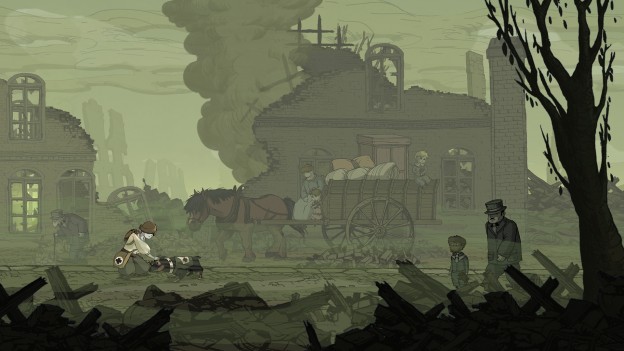Valiant Hearts is the only war game I would ever teach students as a historical text. Focusing on the emotion and personal experience of World War I, Valiant Hearts fills a niche regarding social history and the stories of the past.
Released in the summer of 2014, Valiant Hearts is a puzzle game that follows the major events of World War I between the French and German entrance into the war and the arrival of American troops in 1917. Rather than focusing on a central protagonist, like most war games, Valiant Hearts instead follows four individuals (and a dog): Emile, a French farmer; Freddie, an American of mixed ancestry; Karl, a German soldier married to “Emile’s daughter; and Anna, an aristocratic Belgian veterinarian. The player controls the four characters throughout the war as their distinct narratives intersect along the French-German line.
Although the game ostensibly is a puzzle game, these elements often feel tacked on in order to ensure that Valiant Hearts could be considered “a game” by hardcore enthusiasts. Instead, the main thrust of the game focuses on the emotional and personal toll of war as the backstories of the four characters are slowly revealed. Freddie, for instance, seeks revenge for the death of his white, American wife, after they had traveled to France in 1914 to legally marry. Emile, the French farmer, was simply drafted into the war and does everything in his power to get back to his daughter and grandson.
In contrast with other prominent war games, these stories do not focus on the heroism and seeming invincibility of a single protagonist. Many war games, including the Call of Duty, Metal of Honor, and Battlefield series, create power fantasies involving an implausible narrative in an historical setting. While this hero visits historical sites and set pieces, they ultimately fail at getting the feeling of war across from the perspective of an ordinary soldier or civilian.
Read More: Valiant Hearts, The Great War, and The Shaping of Historical Memory

